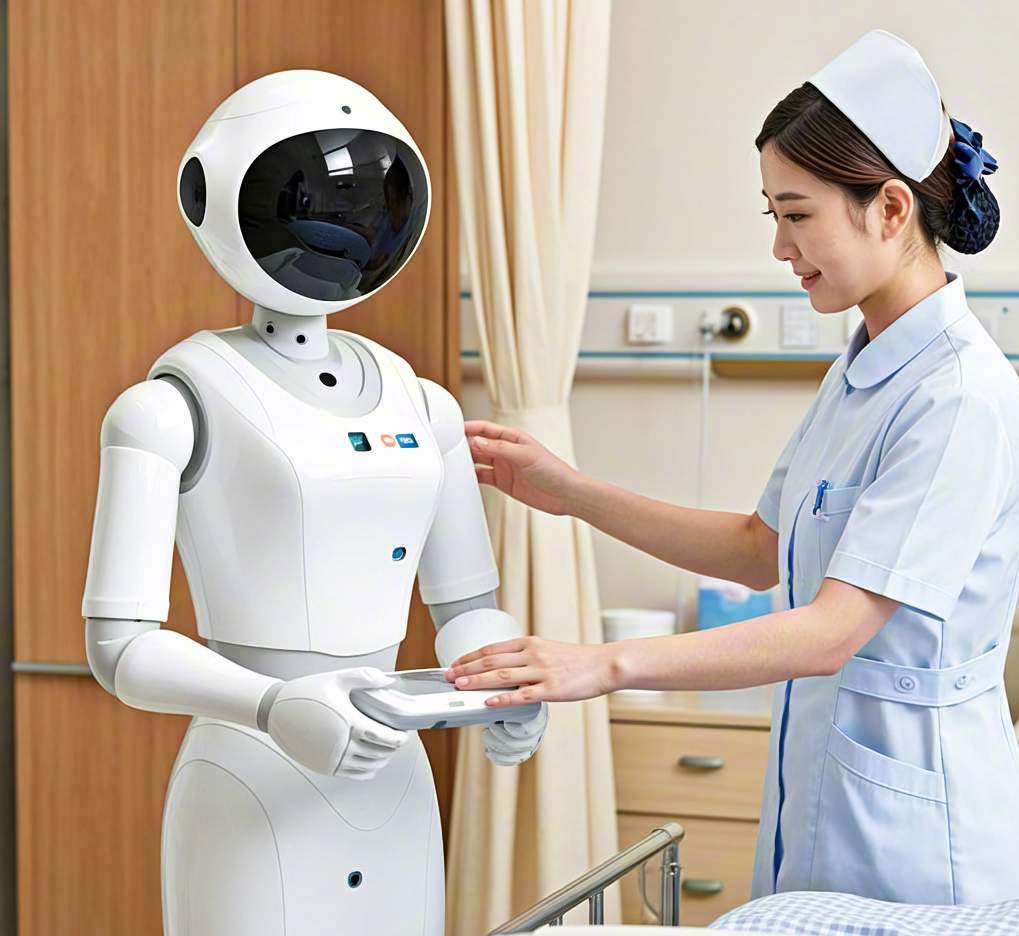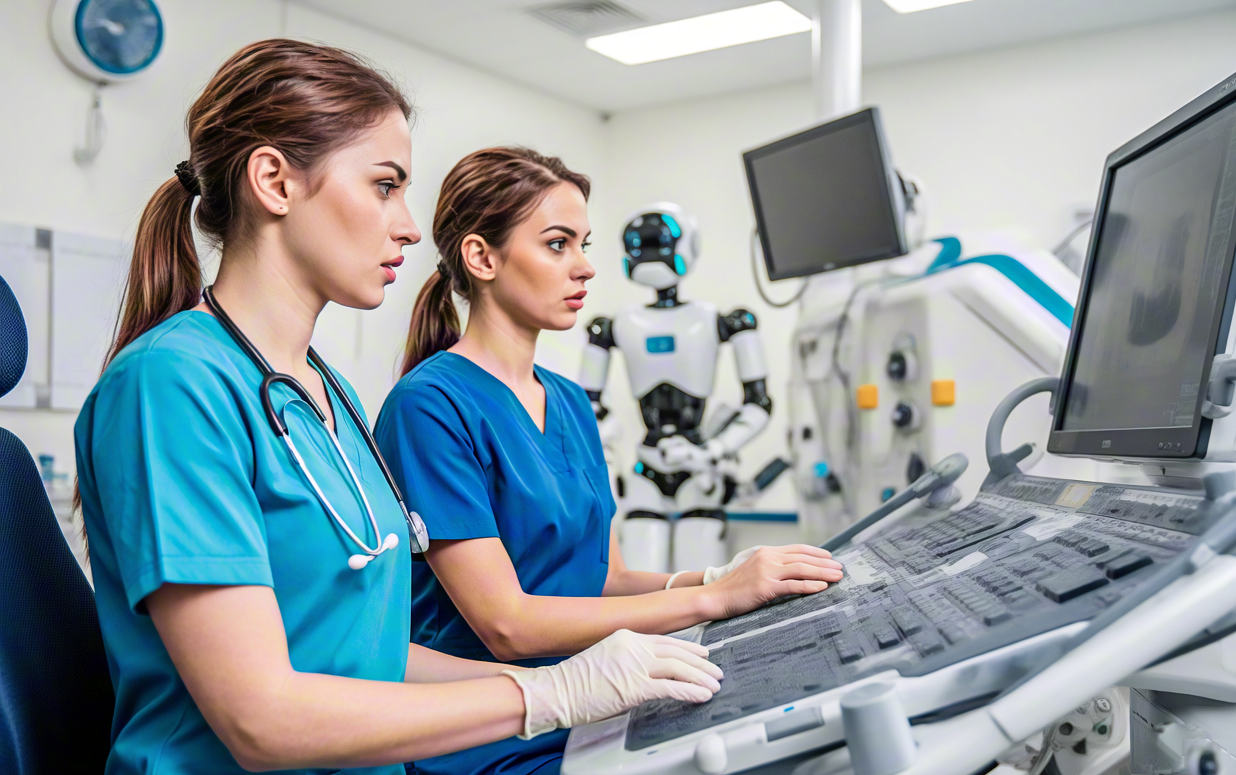Artificial intelligence (AI) is making significant inroads in hospitals, with technologies increasingly tasked with roles traditionally held by human nurses. From scheduling appointments to monitoring vital signs and even flagging potential medical emergencies, AI-powered tools like Ana are reshaping healthcare dynamics. While some celebrate this technological advancement as a solution to understaffing and burnout, others are concerned about its potential to undermine human expertise and the quality of patient care.
AI-Assisted Healthcare: A Growing Trend
Across the United States, hospitals are integrating AI systems that handle administrative duties, patient communication, and even early detection of health issues. Companies like Hippocratic AI are at the forefront of this revolution, creating affordable AI assistants that cost a fraction of a nurse’s hourly wage—$9 per hour versus $40 for a registered nurse. These systems can work around the clock, analyzing data from patient records, sensors, and other devices to assist in diagnosis, monitoring, and the initiation of care protocols.
For instance, AI assistants can identify potential sepsis cases by flagging abnormal vital signs, reducing the time nurses spend on routine monitoring tasks. The use of AI, proponents argue, alleviates the strain on healthcare workers, particularly in an era marked by widespread burnout and nursing shortages exacerbated by the COVID-19 pandemic.
The Pushback from Nurses: Is AI Really a Solution?
Despite these promising advancements, many nurses view AI as a potential threat to their profession. Unions like National Nurses United have expressed concerns that AI is being introduced not as a supportive tool, but as a way to “de-skill” healthcare, eventually replacing nurses with machines. They argue that this shift could lower the quality of care, especially when dealing with complex patient needs that require human empathy and judgment.
Michelle Mahon of National Nurses United said:
“Hospitals have been waiting for the moment when they have something that appears to have enough legitimacy to replace nurses. The entire ecosystem is designed to automate, de-skill and ultimately replace caregivers.”
This sentiment is shared by several healthcare professionals, who fear that automation may lead to a reduction in the critical thinking and expertise that human nurses bring to patient care. These concerns were reinforced by incidents in which AI systems have made false alarms, like flagging routine bodily functions as medical emergencies, or even recommending treatment that contradicts a nurse’s clinical expertise.
One such case occurred when an emergency room nurse at Dignity Health in Nevada followed an AI protocol recommending a large dose of IV fluids for a patient suspected of sepsis, only to discover that the patient was on dialysis and at risk of kidney overload. The nurse questioned the AI’s recommendation, only for a physician to intervene and adjust the treatment. This incident highlights the potential risks of relying solely on AI to guide clinical decisions.
Augmenting Human Care: A Balance Between Technology and Expertise
While AI’s role in improving operational efficiency and patient care is undeniable, experts emphasize the need for a balanced approach. Michelle Collins, dean of Loyola University’s College of Nursing, points out that even the most sophisticated AI cannot replace the nuanced observations of a skilled nurse—such as reading a patient’s facial expressions or detecting subtle signs of distress. AI may be adept at analyzing data, but it lacks the emotional intelligence and intuition that human nurses provide.
However, it would be shortsighted to reject AI entirely.
Collins pointed out:
“It would be foolish to turn our back on this completely. We should embrace what it can do to augment our care, but we should also be careful it doesn’t replace the human element.”
By taking over time-consuming administrative tasks, AI frees up nurses to focus on higher-level, patient-centric work. In this way, AI can act as a force multiplier, enhancing care without displacing the essential role of human professionals.

AI’s Role in Administrative Efficiency
AI’s effectiveness in streamlining administrative tasks is already evident in hospitals across the country. For example, at the University of Arkansas Medical Sciences, AI assistants help schedule surgeries and contact patients, saving nurses countless hours spent on repetitive tasks. The system handles everything from verifying prescriptions to reviewing patient health histories, ensuring that nurses can devote more time to patient care rather than administrative duties.
In addition to improving operational efficiency, AI’s round-the-clock availability provides a significant advantage in terms of accessibility. While human nurses have limits on working hours, AI systems can continuously monitor and communicate with patients, ensuring that no task goes unnoticed. This capability is particularly valuable in areas with fewer healthcare workers, such as rural hospitals or understaffed facilities.
A Look Ahead: What Does the Future Hold?
The future of AI in healthcare seems poised for growth, but its integration into medical environments must be handled with caution. As technology continues to evolve, it will be crucial to ensure that AI remains a tool for enhancing human care rather than replacing it altogether. This means maintaining strict oversight, involving nurses in the design and implementation of AI systems, and ensuring that these tools are used in ways that respect the expertise of healthcare workers.
Moreover, as the aging U.S. population and nursing shortages continue to create challenges, the role of AI in relieving some of these pressures will become even more vital. However, this should not come at the expense of the human touch that is so essential in healthcare. For AI to be truly transformative, it must augment, not diminish, the role of human caregivers.
In conclusion, while AI holds great promise for improving efficiency, reducing burnout, and addressing understaffing in healthcare, its widespread adoption should be carefully managed. The key to a successful integration of AI in hospitals will be finding the right balance between automation and human care, ensuring that technology complements, rather than replaces, the irreplaceable qualities of human nurses.
